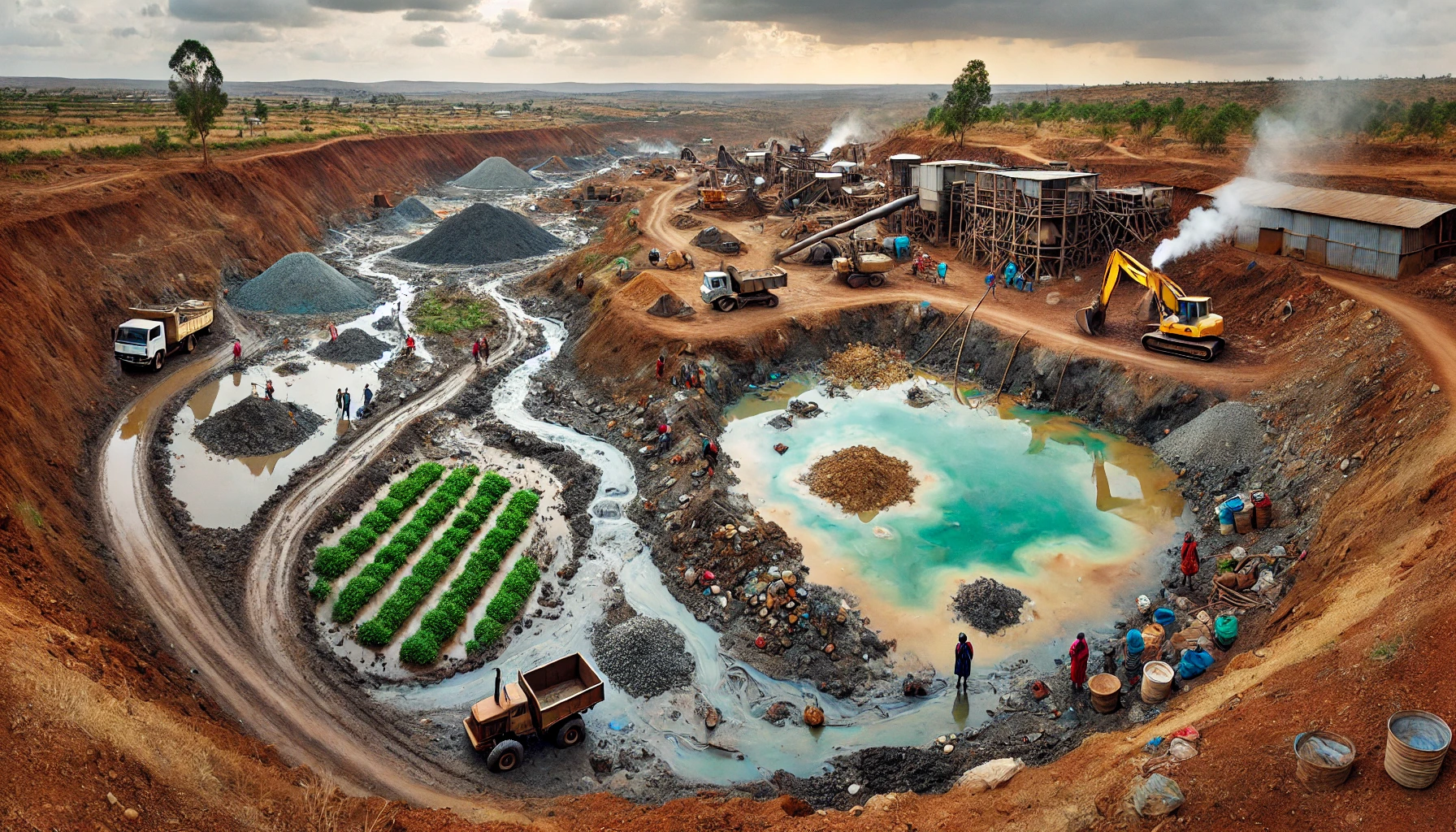The Hidden Costs of Heavy Metals: Ethiopia’s Battle with Pollution and Health Risks
Heavy metal contamination in Ethiopia poses severe public health risks and economic burdens, impacting healthcare, agriculture, and environmental sustainability. Urgent multidisciplinary action is needed to mitigate these effects and promote sustainable development.

A comprehensive study by Yohannes Gelaye from the Department of Horticulture, College of Agriculture and Natural Resources at Debre Markos University, Ethiopia, sheds light on the severe public health and economic burdens caused by heavy metal contamination in Ethiopia. This issue has become more pressing due to the country’s rapid industrialization, unregulated mining activities, improper waste disposal, and unsafe agricultural practices. Heavy metals such as lead, mercury, cadmium, and arsenic are the primary contaminants, that have been found in water, soil, air, and even food sources, leading to serious health risks for Ethiopia’s population. The review highlights that the health impacts of heavy metals are not only widespread but also persistent, affecting communities with long-term illnesses such as neurological disorders, kidney disease, respiratory conditions, and cancer. Children and pregnant women are particularly vulnerable, and in many cases, they lack adequate access to healthcare, which exacerbates the problem.
Rising Healthcare Costs and Economic Strain
Ethiopia’s economic burden from heavy metal contamination is equally concerning. Healthcare costs continue to rise as more people suffer from chronic diseases caused by prolonged exposure to these toxins. Treating these conditions requires significant financial resources, and the healthcare system, which is already under strain, is forced to allocate more funds toward managing these health crises. Additionally, there is a direct impact on the country’s productivity, as those affected by heavy metal poisoning experience reduced work capacity and, in some cases, long-term disability. The agricultural sector, which is a major part of Ethiopia’s economy, also suffers from the contamination. Heavy metals that seep into the soil decrease its fertility, leading to lower crop yields and negatively affecting food security. In rural areas, where agriculture is a primary source of income, this loss of productivity deepens poverty and further challenges Ethiopia’s development goals. The review also notes that environmental cleanup and remediation efforts are incredibly costly. Ethiopia, like many developing nations, lacks the financial and technical resources necessary to address these environmental hazards on a large scale. As a result, contaminated sites often remain untreated, perpetuating the cycle of environmental degradation and public health crises.
Industrial and Agricultural Practices Fuel Contamination
Heavy metal contamination is not a problem unique to Ethiopia, but its impact is particularly devastating in low-income countries that lack strong environmental regulations and enforcement. Industrial activities such as mining, metal processing, and manufacturing are major contributors to heavy metal pollution in Ethiopia. In addition, the practice of informal artisanal mining, which is often unregulated, has led to widespread contamination of water bodies and agricultural land. The review emphasizes that the contamination from heavy metals is not only a result of industrial waste but also agricultural practices that utilize contaminated water for irrigation. This further compounds the problem, as crops absorb these toxins, which then enter the food chain, posing health risks to consumers. Livestock are similarly affected, and their exposure to contaminated water and feed can lead to health issues that reduce their productivity and pose risks to human health through the consumption of meat and dairy products.
Multidisciplinary Solutions for Public Health and Environment
Addressing the public health and economic challenges posed by heavy metal contamination requires a coordinated, multidisciplinary approach. The review underscores the need for stricter regulatory frameworks and better enforcement of environmental laws to control industrial emissions and prevent further pollution. Strengthening waste management systems is another critical step, particularly in industrial areas and informal mining zones. Public awareness campaigns are also essential to inform communities about the risks associated with heavy metal exposure and how they can protect themselves. Investing in innovative technologies for pollution control and remediation, such as bioremediation and phytoremediation, is highlighted as a potential solution to mitigate the effects of contamination. Additionally, the review stresses the importance of international collaboration in tackling this issue. Developing countries like Ethiopia can benefit from partnerships with global organizations, research institutions, and international donors to secure the expertise, funding, and technical resources needed to address the problem. There is also a call for more research into alternative agricultural practices and sustainable development strategies that can reduce reliance on contaminated water and soil, thus improving food security and reducing the risk of further environmental degradation.
Economic Costs Beyond Healthcare
The economic toll of heavy metal contamination goes beyond immediate healthcare costs and productivity losses. It also affects sectors like tourism, which suffers as environmental degradation becomes more visible, and agricultural exports, as international markets become wary of importing contaminated products. To safeguard both public health and economic stability, Ethiopia must prioritize the management of heavy metal contamination through stronger environmental governance, increased investment in health infrastructure, and the promotion of sustainable industrial and agricultural practices.
A Call for Urgent Action
The review concludes by calling for urgent action from all sectors of government, industry, academia, and civil society to collaborate in addressing this pressing issue. By pooling resources, expertise, and political will, Ethiopia can mitigate the impact of heavy metal contamination and work toward a healthier, more sustainable future.
- FIRST PUBLISHED IN:
- Devdiscourse
ALSO READ
Fluoridation Face-Off: Balancing Public Health and Personal Choice
World Bank Approves $250M for Türkiye’s Public Health Emergency Preparedness
Facebook Moderators Under Siege: Ethiopian Rebels Threaten Amid Meta Dispute
Ethiopia Advances Disability-Inclusive Health Services with Successful WHO-Led Workshop
Somali-Ethiopian Tensions: Leaders Meet in Ankara Talks










